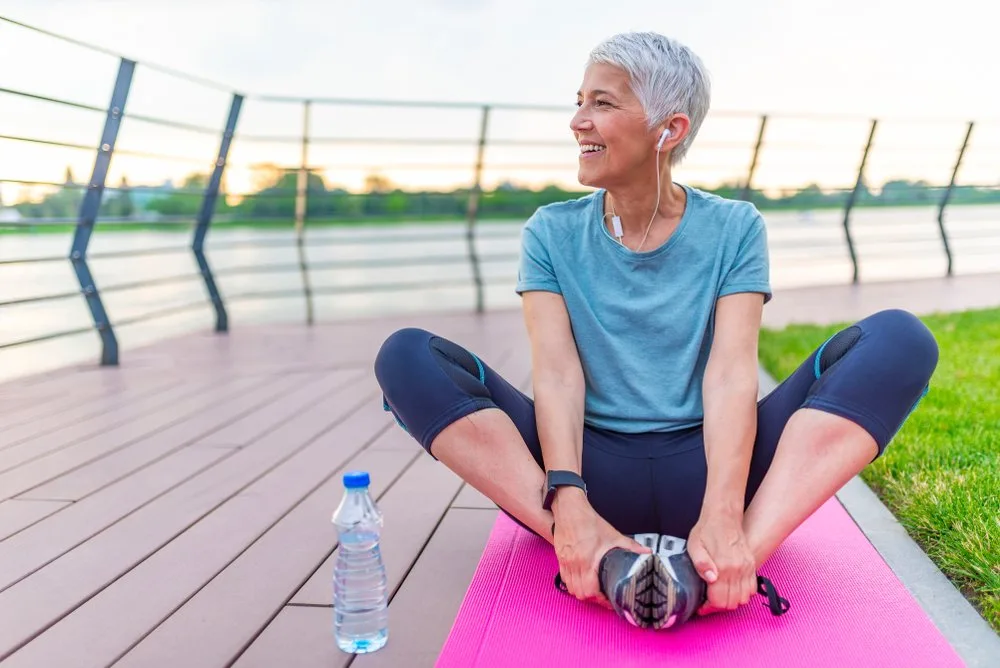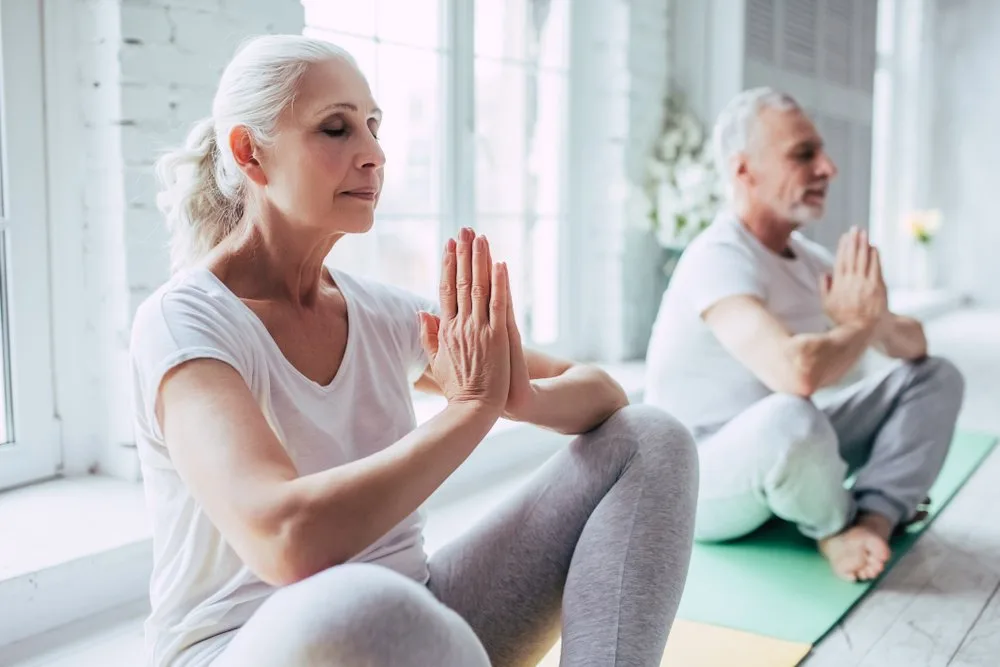It can be easy to believe that yoga is a practice for the young – especially as the vast majority of images depicting yoga feature very youthful women engaging in impressive feats of flexibility. However, we do not need gymnastic skills, years of training, and fewer than forty candles on the birthday cake to make yoga part of our lives. As a form of exercise and meditative practice, we can embrace yoga at any stage of life, and gain many benefits from doing so.
In recent years, some fantastic yoga practitioners have been working hard to gain representation and depict the true diversity of yoga. Yoga is a broad and adaptable practice that can be used by anyone (whatever their health status, body type, gender, or ethnicity), and it can be particularly helpful as we grow older.
One key factor that separates yoga from other forms of exercise is that in bringing attention to and coordinating the breath with the movement of the body, yoga is a practice in mindfulness. It holistically supports our well-being by promoting a mind-body connection and can help us both prevent and ease the symptoms of many common health conditions.
1. Lowering the risk of heart disease
Early research into the benefits of yoga for our heart health has been so promising that both the British Heart Foundation and the American Heart Association recommend the practice as part of a healthy living plan, with yoga having been linked to reductions in blood pressure, blood glucose level, cholesterol level, and body weight.
One promising study by the American College of Cardiology found that people who combined yoga practice with aerobic exercises, such as running or swimming, saw double the reduction in high BMI, cholesterol levels, and blood pressure in comparison with people who were taking part in just one or the other exercise.
Yoga is also helpful in allowing us to better control lifestyle factors that have a big influence on our heart health, such as smoking. In a growing body of research, mindfulness is proving to be a highly effective smoking cessation tool, and by quitting smoking people reduce their risk of suffering from heart disease, stroke, and other cardiovascular issues.
2. Improving our balance, strength, and flexibility
Generally speaking, yoga is a gentle exercise. However, that doesn’t mean there aren’t physical benefits to be gained from practicing it. In fact, yoga can build our muscle strength (especially if we are unused to holding our own weight), develop our balance, and increase our flexibility. As we get older and find we need to look after ourselves a little more, all of these factors can help us feel at our best, and counteract some of the stiffness and pain associated with middle and old age.
Once we’ve ticked off a few years of our retirement, we may find ourselves a little more unsteady on our feet and less able to bounce back from injuries. By improving our balance and strengthening our knees and ankles, yoga makes it easier to avoid slips and falls and allows us to feel more confident within ourselves.
If you already live with osteoporosis or arthritis, it’s important to engage a trained yoga therapist if you would like to practice yoga. They can instruct you on the safest and most beneficial poses for your condition. When practiced with this kind of guidance, yoga can help to reduce pain and mobility issues. It can also offer an outlet if other forms of exercise have become inaccessible.
4. Maintaining social connections
It isn’t unusual for people to realize that, once their children have grown more independent or their professional responsibilities are winding down, in the maelstrom of life, socializing was put on the back burner. Finding new friendships and joining new groups can be really revitalizing. A yoga class is the perfect way to develop a new hobby with an often diverse mix of people and age groups.
Social isolation isn’t only bad for our mental wellbeing. It’s bad for our health as it is linked to an increase in the stress hormone cortisol. It can affect anyone at any age. However, loneliness appears across many countries to be more prevalent in men (perhaps due to a “lone wolf” view of masculinity) and can be more difficult to overcome in later life.
By fostering a sense of connection, lowering stress, providing social opportunities, and increasing peoples’ sense of self-worth, yoga tackles the problem of loneliness on many levels and helps us maintain our social life.
5. Promoting more restful sleep
When researchers looked into the sleep habits of older Americans, they noticed the following:
- An increase in the time it takes to fall asleep (sleep latency)
- The overall decline in REM sleep
- An increase in sleep fragmentation (waking up during the night)
- An increase in the prevalence of sleep disorders
At the most basic level, sleep lets us enjoy our days feeling rested and energized. However, it is also a vital part of our overall well-being. Lack of sleep has been associated with faster cellular aging and a greater risk of illness. In deep sleep, our bodies regulate chemicals like insulin and glucose. It also carries out a variety of important biological processes such as cell regeneration and muscle growth.
Breathing exercises, asanas (poses), and mindfulness used in yoga foster a sense of relaxation and calm. They encourage us to wind down before bed. The impact this has on our sleep quality has been observed in studies. Participants who practiced yoga fell asleep faster and stayed asleep longer. This is great news for anyone who spends hours tossing and turning!

6. Helping us manage mid and late-life stress
Many people suffer a peak of stress in their middle age. In fact, the Gallup-Healthways Well-Being Index suggests that women aged 45 to 64 have the lowest well-being of any age group or gender.
Responsibility at work, caring for elderly parents, looking after children and the financial stress of bills and mortgages can all pile on the pressure.
To add insult to injury, chronic stress has been linked to an accelerated aging process by shortening our “telomeres”. Telomeres are a critically important part of every cell in our body. They get shorter over time, eventually leading to cell death. Chronic stress shortens our telomeres and increases the risk of several major diseases, including heart disease.
A variety of studies suggest that people who practice yoga benefit from lower levels of the stress hormone cortisol. They also have lower perceived stress levels. They’ve also been found to have reduced levels of pro-inflammatory cytokines which cause inflammation. Mindfulness has even been linked to density changes in areas of the brain associated with our stress response. This suggests that its calming effect is so profound it impacts our neurology.
7. Benefiting our mental health
Yoga reduces physical and mental stress and improves our sleep. It also cultivates a profound mind-body connection. As a result, yoga has a profoundly beneficial effect on our mental health. Whether it’s helping us to recover from trauma or lessening feelings of anxiety. The fact is that by using yoga to explore and interact with our emotions, we grow both in self-awareness and self-reliance.
Yoga is especially helpful in allowing us to become less reactive to stressful triggers. This includes triggers from both the external world and our own internal worries. Research indicates that yoga modulates our stress response systems. It takes us out of “fight or flight” mode and into “rest and repair”. This decreases physiological stress and helps us become more resilient to the challenges of life.

Conclusion
With such a multitude of physical and mental health benefits, yoga can help us embrace the passing of time and remain happy and healthy with each new year.
References
- https://www.mindbodygreen.com/0-20687/12-rockstar-yogis-who-are-leading-the-bodypositive-movement.html
- https://www.health.harvard.edu/blog/more-than-a-stretch-yogas-benefits-may-extend-to-the-heart-201504157868
- https://www.onlinejacc.org/content/71/11_Supplement/A2115
- https://www.bhf.org.uk/informationsupport/heart-matters-magazine/activity/yoga
- https://www.statnews.com/2019/06/14/quitting-smoking-mindfulness-new-approach/
- https://www.nhs.uk/live-well/exercise/guide-to-yoga/
- https://www.agingcare.com/articles/falls-prove-fatal-for-elderly-patient-149687.htm
- https://www.health.harvard.edu/womens-health/yoga-another-way-to-prevent-osteoporosis
- https://www.arthritis.org/health-wellness/healthy-living/physical-activity/yoga/yoga-benefits-for-arthritis
- https://www.bbc.co.uk/news/health-21517864
- https://www.oecd.org/sdd/37964677.pdf
- https://www.sleepfoundation.org/articles/aging-and-sleep
- https://aasm.org/partial-sleep-deprivation-linked-to-biological-aging-in-older-adults/
- https://www.sleepfoundation.org/articles/connection-between-yoga-and-better-sleep
- https://www.psychologytoday.com/gb/blog/the-athletes-way/201404/emotional-distress-can-speed-cellular-aging
- https://www.medicalnewstoday.com/articles/326414#stress
- https://www.washingtonpost.com/news/inspired-life/wp/2015/05/26/harvard-neuroscientist-meditation-not-only-reduces-stress-it-literally-changes-your-brain/
- https://www.healthline.com/nutrition/13-benefits-of-yoga#TOC_TITLE_HDR_9
Who is the author?
Heather Mason is a yoga therapist, campaigner, and founder of The Minded Institute, a world leader in the development and implementation of yoga therapy and mindfulness programs. Heather trained as a yoga teacher and completed an MA in Buddhist Studies at SOAS University London. She later obtained an MA in Buddhist-Based psychotherapy.

During this time, she became interested in mind-body therapies, and took a sabbatical to study yoga therapy and neuroscience. She then completed an MSc in Medical Physiology, allowing her to take a systemic view of yoga’s efficacy in health.





![women [longevity live]](https://longevitylive.com/wp-content/uploads/2020/01/photo-of-women-walking-down-the-street-1116984-100x100.jpg)









